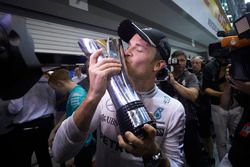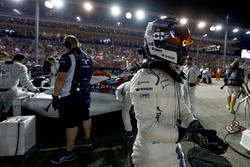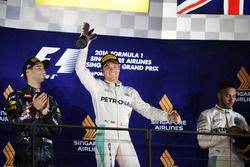Opinion: The momentum myth means Hamilton is far from done
Nico Rosberg's Mercedes Formula 1 car had barely cooled down after his stunning Singapore Grand Prix before some were suggesting that Lewis Hamilton's title charge was at risk of going off the rails.

Photo by: XPB Images





















Rosberg's third consecutive victory to retake the lead of the world championship was being viewed in some quarters as a sign that the momentum of this year's championship had been firmly seized by the German and that Hamilton was on the ropes.
In his post-race media briefing on Sunday night, Hamilton was repeatedly pushed on what it was going to take for him to get the momentum back in his title chase.
"I don't really have an answer for it, you know, because every year is different," he said. "It's just the way it goes. Some weekends he does great, some weekends I do great.
"Nico just did an exceptional job this weekend and we didn't. What it's going to take? Just some good weekends, which we've had in the past.
"It's a bunch of s**t, a combination of things all together, which ultimately make a perfect weekend."
He is right, of course – sport has a great way of resetting success/failure in an instant. Just look at the Monaco GP this year: Hamilton was 43 points down heading into that race, amid fears that he could even endure a win-less 2016 campaign.
His brilliant triumph on the streets of Monte Carlo, as Rosberg struggled in the wet, reset the title battle as he reeled off a run of six wins from seven races.
If momentum can stop in an instant, it's not really momentum, is it?
Spa and Monza woes
One of the problems of suggesting that Hamilton is in a difficult position after Rosberg's recent hat-trick is that the reality of the past three races does not justify the conclusion that psychologically he is down.
At Spa-Francorchamps, it was an open-goal for Rosberg because Hamilton needed an engine changes (as a result of the problems that had hurt him earlier in the season), while at Monza, a poor getaway sealed his fate.
With the Mercedes never at its best when following the turbulent air of another car (look at how Rosberg struggled to recover in Hockenheim), plus the handicap of Pirelli's degradation meaning drivers can never really push to the maximum to close down big gaps, second place in Italy was really the best Hamilton could expect considering where he was on lap one.
Singapore was different though, for Hamilton was beaten fair and square. But the 0.704 seconds gap to Rosberg in qualifying can be mostly explained by the Briton's difficult Friday, which included losing valuable FP2 time with a hydraulic leak, and the limited laps in low-fuel trim he managed before qualifying as he struggled with brakes.
In the end, Rosberg was on superb form – perhaps the best of his career – to deliver an impressive win.
But just as one swallow doesn't make a summer, so too one bad weekend for Hamilton and a stunning one for Rosberg does not mean the championship is done.
One of the things that has characterised the recent title battles between Hamilton and Rosberg is the ability of both men to bounce back from bad spells. It's as though they have an instant reset button.
During their last three years together, success has swung in both directions and very often there have been good victory runs for both.
But one aspect that has always come into play is that at some point the winning streak of one of the drivers ends, and the other one comes out on top. The second that happens, all the talk of momentum dies away.
The momentum myth
In fact, there are serious doubts that momentum in sports actually exists as a force to make a difference to the competitors.
Numerous academic papers have been written analysing success and perceived momentum in sport – check out The Hot Hand in Basketball: On the Misperception of Random Sequences - and the repeated conclusion is that momentum of good results neither increases nor decreases chances of success in the future.
Detailed statistical analysis has been done to show that if a basketball player has hit a 'hot streak' of baskets, it does not actually increase his chance of extending it.
However, what does happen is that the momentum becomes perceived as a force for good by fans and those playing on the court with him.
As an example, despite there being no proof that a 'hot' scorer has any better chance of adding more success, the above study discovered that 91 percent of fans believed that a player had "a better chance of making a shot after having just made his last two or three shots than he does after having just missed his last two or three shots."
Transfer that to F1, and it is easy to see why people think that a driver who has won three races in a row has a better chance of winning the fourth. It's not necessarily true.
The misconception comes from a belief that if events were simply down to chance, then the average player would score every other shot, or a driver would win every other race against his teammate. Therefore, if a run starts it must point to something extraordinary happening.
But chance does not work like that. We all know that if you flip a coin, its roughly 50/50 odds of landing heads and tails. But that does not mean that it consistently alternates between the two as you flip – nor that there is ever a greater than 50/50 chance of it falling one way.
Flip a coin 100 times and there will be long runs of heads and tails just because that is the way randomness works. To suggest that 'heads' had gained momentum after a 10-flip streak would be wrong.
As teammates, Hamilton and Rosberg have shared the majority of wins in F1 over the past three seasons. And, just as chance has long streaks of success for one side or the other, so the two men in equal machinery have had their success divided up in to patterns – which are then interpreted afterwards as having some special meaning.
Try this now: toss a coin 15 times to share out the numbers of races so far this season (heads for Hamilton and tails for Rosberg), and award the wins. They don't alternate: patterns do emerge.
When I did it, the wins were fairly evenly spread early on but then Rosberg got on a three-race streak from Silverstone to Germany, before Hamilton won at Spa, Monza and Singapore. Those runs of 'momentum' are the result of pure chance.
F1 wins of course are not decided on pure luck, and there are a myriad of technical and human performance issues that decide wins.
But in the situation that Rosberg and Hamilton find themselves in, when two equally matched men go in to attack with equal machinery, then there is very little to choose between the pair of them. History shows us that both are capable of delivering on a set weekend and neither men has even been done and dusted.
So Hamilton is right: there is no need for a dramatic psychological reset about how to approach his campaign.
For all it will take for the perception that Hamilton's title momentum has fallen away is one good weekend, and he's had plenty of those in the past.
Be part of Motorsport community
Join the conversationShare Or Save This Story
Subscribe and access Motorsport.com with your ad-blocker.
From Formula 1 to MotoGP we report straight from the paddock because we love our sport, just like you. In order to keep delivering our expert journalism, our website uses advertising. Still, we want to give you the opportunity to enjoy an ad-free and tracker-free website and to continue using your adblocker.























Top Comments